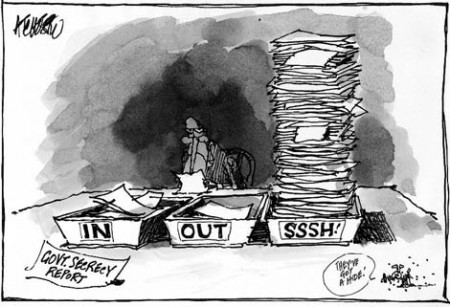In 1990, science fiction writer David Brin released “Earth”, a book that was set 50 years in the (then) future, or about 2038. It extrapolated a number of things–increased UV and higher coastlines due to global warming, for example (Houston is inundated with water like Venice!). One of the key back plot elements, though, is a “Helvetian War”, a war fought against the Swiss to end the secrecy of the Swiss banks, and attempt to get the people back some of the ill-gotten gains of the rich. (Switzerland is turned into a radioactive abattoir as a result, so it’s kind of a mixed deal.) But the bottom line is, secrecy has become socially unacceptable; neither individuals nor governments keep secrets.
I was thinking about this recently while creating a budget for tax purposes (don’t ask); bear with me on this:
As part of listing my monthly outgoing expenses, since we almost always use our Visa/Versatel cards for our transactions, I was able to get dollar amounts–exact dollar amounts–for everything from gas for the car to electricity for the house to how much we spent on groceries. A decade or more ago, this information would have been scattered among my checkbook, various credit cards, cash transactions, and (a few) Visa/Versatel purchases. Now? Almost all the information is available via my online bank statement, going back a year. (For longer, you have to get copies of the monthly statements.)
And we’re not helping the situation in our personal lives. How many accounts do you have on sites like Facebook or Twitter? How much of your data are you storing in the cloud? How many companies do you give your credit card info to “for verification purposes”, but which puts you in their database? A lot.
And there’s the rub, isn’t it? If I can access that information so easily, what’s to keep anyone else from accessing it? Especially since it’s all pretty much in one place.
Now this is hardly a new worry for a lot of people, but as Brin pointed out, this transparency/easy availability of information only seems to go in one direction; governments, big business, and the powerful/wealthy can hide behind walls of secrecy and obfuscation. “Official secrets”, “need to know”, offshore accounts, phalanxes of lawyers, accounting tricks . . . all these can hide information from the public. But for the public? Hell, they can go rummaging around in your files nowadays without even a warrant, just by saying “the President thinks this guy might be a terrorist.”
The older I get, and the more I think about it, the more I think Brin is right: secrecy is over, and the only thing we can do is demand transparency from everyone. You may think you have secrets, but if someone wants to find out most anything about you, you really don’t; it’s all available online now. But government secrets? Corporate secrets? Rich folks? Nope; they’re still behind a wall. Can that situation go on, or is it inherently unstable?
I don’t have an answer, but like Brin, I don’t think it can really last. How much longer are people going to accept the fact that all their information can be accessed by pretty much anyone, but that the rich, the powerful, governments, big business, and so on can hide behind a wall of secrecy? Do we need a Helvetian War to fix the situation? People with torches, pitchforks, guns, rocket launchers, and whatnot storming gated enclaves in the Hamptons? I don’t know, but I don’t think it can last. What do you think? Share below!


I think you are exaggerating slightly. For example, I challenge you to find financial information about yourself that is not secured by some sort of wall. Credit card accounts needs to be secured by PCI standards and they are rigorous. Going through even a self assessment for PCI is enlightening.
As for the social sites….Facebook, Google, Pintrest, Path and others have ONLY what YOU put on them. You don’t want it known, don’t put in on the social web. Easy peasy.
Oh and as for the Pintrest storing address book thing….it’s already solved and I remember not too long ago where everyone’s info was in this thing called….the Phonebook.